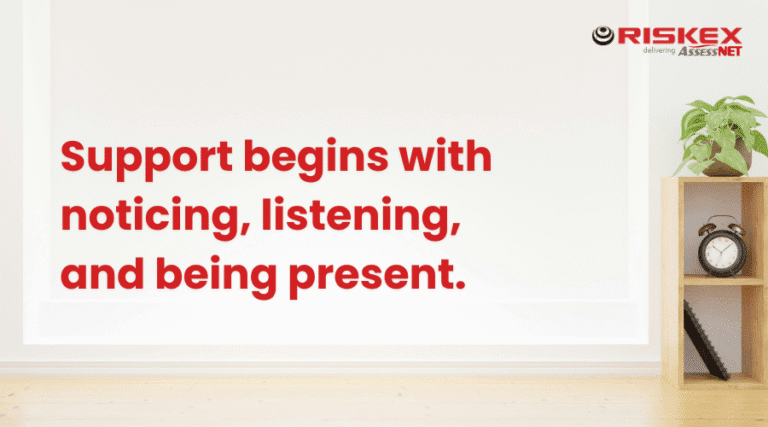In recent years, mental health has rightly taken a more prominent place in workplace wellbeing strategies. Just as we wouldn’t hesitate to have trained first aiders for physical injuries, mental health deserves the same proactive approach. Appointing a Mental Health First Aider (MHFA) within your organisation is a powerful step toward creating a supportive, healthy, and productive work environment.
Why every company should have a Mental Health First Aider
Mental health issues are one of the leading causes of workplace absence in the UK, with stress, anxiety, and depression contributing to a significant proportion of lost working days. Despite this, many employees still feel uncomfortable seeking support or disclosing their struggles.
Having a designated Mental Health First Aider helps to:
- Reduce stigma around mental health
- Provide early intervention before issues escalate
- Encourage open dialogue and a more compassionate culture
- Support compliance with your duty of care under the Health and Safety at Work etc. Act 1974
Who is best suited to be a Mental Health First Aider?
The ideal MHFA is someone who:
- Is approachable, empathetic, and a good listener
- Has a genuine interest in supporting others
- Can remain calm under pressure
- Understands the importance of confidentiality and boundaries
- Has the time and organisational support to fulfil the role properly
This person could be from any level or department – line managers, HR staff, or colleagues in peer roles. What matters most is their commitment and the trust they command within the team.
Benefits of having a Mental Health First Aider
Investing in a MHFA programme can lead to a number benefits:
1. Improved staff wellbeing
Employees are more likely to seek help early when they know a trained, supportive individual is available.
2. Reduced absenteeism
Early intervention helps prevent mental health issues from worsening, keeping people at work and engaged.
3. Enhanced company culture
It signals a genuine commitment to staff wellbeing and fosters a more inclusive, supportive workplace.
4. Better retention and engagement
When staff feel valued and supported, they’re more likely to stay and perform better.
5. Legal and ethical best practice
While not yet a legal requirement, having MHFAs is increasingly considered good practice and part of a robust risk management strategy.
How to implement a Mental Health First Aider in your organisation
1. Get senior buy-in
Leadership support is essential. Frame it as part of your health and safety or wellbeing strategy and tie it to broader goals like engagement, retention, and compliance.
2. Select the right people
Identify staff who meet the traits listed earlier, and ensure they volunteer for the role rather than being appointed without consent.
3. Invest in quality training
Enrol your chosen staff in a recognised MHFA course. The Mental Health First Aid England (MHFA England) course is the most widely recognised.
4. Create a supportive framework
- Clarify roles and boundaries
- Establish referral procedures (e.g. to EAPs, GPs, or counselling services)
- Offer regular debriefs or peer support for MHFAs themselves
5. Raise awareness internally
Let staff know who your MHFAs are, how to contact them, and reassure them that conversations will be treated with respect and discretion.
6. Review and evolve
Monitor how the role is working. Collect anonymous feedback and adjust your approach as your organisational needs change.
Real-World case study
Thames Water
As one of the UK’s largest utilities providers, Thames Water recognised that mental health was a major factor in workplace absence and overall wellbeing. To address this, they launched their Time to Talk strategy, embedding Mental Health First Aid into their organisation by training hundreds of employees.
Key results included:
- More than 350 employees trained as Mental Health First Aiders.
- An 80% reduction in work-related illness absence cases over five years.
- For every one physical first aid intervention, there were five mental health interventions.
- Mental Health First Aiders made visible by green lanyards, helping colleagues feel comfortable seeking support and reducing stigma.
Unilever UK & Ireland
Unilever, a multinational consumer goods company, employs around 7,000 staff across the UK & Ireland in offices, factories, and R&D sites.
Seeing that mental health issues were among the top reasons for sickness absence and for claims through its private medical insurance, Unilever made MHFA training a core part of its Wellbeing Strategy. The programme focuses particularly on line managers: the company created a bespoke half-day version of the MHFA course for them, making it mandatory at key sites.
Key findings included:
- Over half of Unilever’s line managers have now been trained in mental health first aid.
- Employees are more comfortable using “mental health” as a reason for taking sick leave.
- Because people are speaking up more, Unilever is able to collect better data on mental health-related absences and referrals.
- They’ve introduced tools like a “Wellbeing Scorecard” and an online Health Hub to support staff and spot where help is needed.
- Managers now try to begin one-to-one meetings by checking how someone is doing emotionally not going straight into performance.
Conclusion
Embedding mental health first aiders represents a tangible commitment to the people who make your organisation work. It helps foster a culture of openness, care, and resilience, benefitting everyone from junior staff to senior leadership.
Taking the time to train and support MHFAs can be one of the most impactful wellbeing investments you make.






